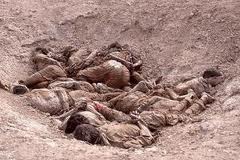 BRUSSELS, — Reacting to a written question tabled by seven members of European Parliament of different political groups and Member States, European Commission expresses its concern about the alleged use of chemical weapons by Turkish military.
BRUSSELS, — Reacting to a written question tabled by seven members of European Parliament of different political groups and Member States, European Commission expresses its concern about the alleged use of chemical weapons by Turkish military.
Enlargement Commissioner Füle reports that allegations have been discussed between Commission representatives and Turkish authorities. While Turkey had promised investigations on the cause of death of 36 PKK fighters on October, 24th 2012, Füle says “Commission will continue to monitor the issue”.
The death of 36 Kurdish guerrillas in Kazan Vadesi (province of Hakkari) has caused controversial public debate since October 2011. Reports given by local residents and a survivor of the attack give reason to suspect that PKK fighters had been killed by illegal chemical weapons. It has been proved that Turkish military deployed banned chemical weapons back in 1999 and stored as well as sold similar weapons in 2010.
Jürgen Klute, substitute Member to the EU-Turkey Parliamentary Committee asks Füle to keep his promise: “For several months now, we have to observe that the Turkish Kurdish conflict is locked in a process of renewed escalation. From my point of view, Prime Minister Erdogan is about to drive Turkey into further violence, trying to solve the Kurdish conflict at a military level. The suspicious cases of the 36 PKK rebels killed in Kazan Vadesi contribute to rising tensions in Turkish society. Suspicions about war crimes hamper the reconciliation of Turkish and Kurdish population. European Commission must therefore insist on independent inquiries to be allowed by Turkish authorities without further delay. International experts must be invited and all relevant documents, including autopsy reports must be made available. Inquiries conducted behind closed doors only are useless. Transparency is a key factor for investigations to be credible.”
Helmut Scholz, substitute Member to European Parliaments Committee for External Affairs comments: “The left in Germany and Europe supports the accession of Turkey the European Union. But it is clear from our point of view that the relations between EU and Turkey can only be deepened if State and society in Turkey manage to make real progress in terms of democracy, peace and human rights. Turkey ratified the Chemical Weapons Convention in 1997. With this important step, Turkey has committed itself to international law and given a clear statement for the proscription of war crimes. In order to safeguard its credibility in the international community, I strongly recommend to the Turkish government to invite the Organization for the Prohibition of Chemical Weapons (OPCW) in order to refute all suspicions.”
Further Members of European Parliament having signed the question to the European Commission are Cornelius de Jong (Netherlands), Katarina Nevedalova (Slovakia), Jean Lambert and Baroness Sarah Ludford (both United Kingdom).